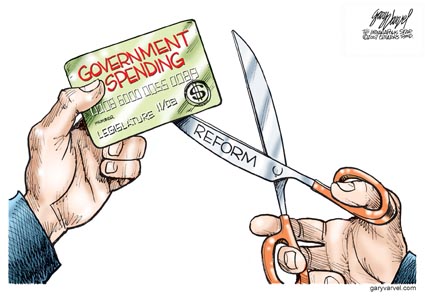 First published in the The Freeman Journal on September 3, 2010, and is reprinted here with the kind permission of the author, Sheldon Richman.
First published in the The Freeman Journal on September 3, 2010, and is reprinted here with the kind permission of the author, Sheldon Richman.
“How will we pay for the tax cut?”
I laugh when I hear that question because it’s so obviously illogical. If the government were to cut taxes, say, by lowering rates or outright repeal, people would simply be free to hold on to money they otherwise would have sent to the IRS under threat of punishment. Allowing them to keep that money requires no expenditure. If the tax cut is dramatic enough, it might save money by permitting a shrinking of the government’s tax-collection machine. In the most basic sense, a tax cut costs nothing.
What people who ask that question really mean is: How will the revenue forgone be made up? Why do they care? Because they don’t want the government to have to cut spending.
Tax cuts don’t cost money; government programs do.
The demand that tax cuts be paid for rests on the claim that government distribution of other people’s resources – euphemistically called “spending” – is sacrosanct. If you dare to propose that less money be sucked into the government’s coffers through one form of taxation, you’d darn well have a plan to make up that lost money because cutting spending is out of the question. That means raising other taxes to offset the cuts.
For those interested in freedom – which must include the freedom to keep the fruits of one’s own labor – that is hardly a satisfactory solution. Do I really care if I surrender my money through an income tax or a sales tax? It’s the demand that I surrender it at all that irritates me.
The question might be intended to point out that revenue shortfalls would have to be made up by borrowing unless other taxes were raised. Borrowing, however, is another form of taxation. Advocates of freedom should always bring the conversation back to spending. Give no aid or comfort to those seeking to raise revenue.
All Income to the State
This is important because when we talk the language of paying for tax cuts we adopt an outlook to which statists implicitly (and sometimes explicitly) subscribe, namely, the view that all income belongs to the State and that any measure that lets us keep some is just another form of spending. Tax credits and tax deductions are called “tax expenditures.” As C-SPAN explains, “Tax expenditures are losses to the U.S. treasury from granting certain deductions, exemptions, or credits to specific categories of taxpayers…. Tax expenditures are an alternative to direct government spending on policy programs.”
Or, to choose a less neutral source, the Center for American Progress says, “The government uses tax expenditures to accomplish the same goals as direct spending, but it transfers money by lowering taxes for an individual or company instead of giving them the money. Tax expenditures are, quite simply, spending programs implemented through the tax code.”
“Transfers money by lowering taxes.” You can’t make this stuff up.
From the conservative camp, we have Martin Feldstein writing in the Wall Street Journal:“These tax rules [intended to encourage certain activity] — because they result in the loss of revenue that would otherwise be collected by the government — are equivalent to direct government expenditures. That’s why tax and budget experts refer to them as ‘tax expenditures.’”
But government’s letting people keep their money is not really equivalent to its spending the money. If it were, the federal budget wouldn’t be $3 trillion-plus. It would be the whole GDP.
True, tax expenditures usually refer to deductions or credits for specific activities. But it’s a short step to believing that even general tax cuts to “stimulate the economy” are a form of government spending too. I imagine some people already believe that.
Of course, government regularly uses the tax code to encourage certain economic activity, such as buying a house or getting medical coverage through one’s employer. By implication it discourages alternative activity. And it’s true that tax credits and deductions can accomplish what a spending program might accomplish. Nevertheless, although manipulation of our lives through the tax code is objectionable, we shouldn’t conflate keeping one’s own money with government spending. That way confusion lies.
Advocates of liberty and autonomy naturally want government’s hands out of their pockets. No one should have to bow and scrape to keep a little more of what he or she rightfully earns. Tax gimmicks are sometimes tempting policies, such as a tax credit for hiring during a recession. But they help to reinforce the pernicious idea that our incomes are a tool of government economic policy.
Better to put our efforts into repealing and reducing taxes and spending wherever we can.


